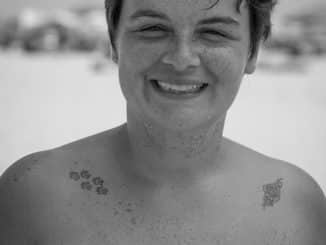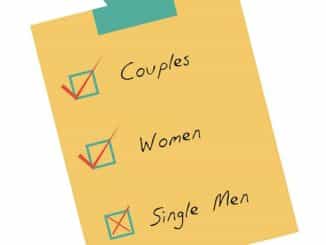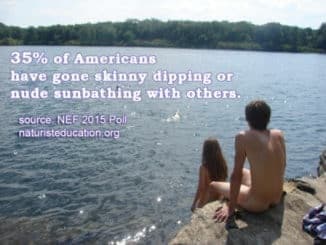Sexual Harassment, Rape Culture & Women Being Naked Online
I’m a naturist, and I’m naked a lot… Most of the time in private or secluded places, but once in a while I’m topfree in public, or naked and covered in body paint in Times Square. This is how I live my life and how I express myself.
There are also naked pictures of me online. Mostly because, like any person, I take photos that document my existence and I also choose to share some of those photos online.
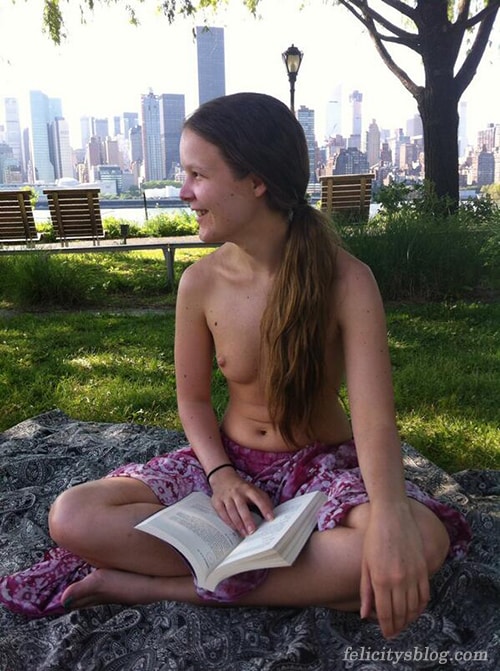
There are people who have a problem with me being naked, for many different reasons, but I want to bring up an issue specifically related to being a naked woman.
Lately there are a lot more feminists and body-positive activists who are choosing to be naked in a public way online. But I’ve noticed that one of the first reactions they get from other people is a concern about perverts. Many people say it’s foolish and counterproductive for women to “reclaim their bodies” by getting naked online. Those people claim that it’s just going to attract perverts who will sexually objectify the women, harass them and make inappropriate comments – like the online version of catcalling.
I’ve been seeing this criticism coming from other women. But that doesn’t surprise me. Women are mainly the ones who have to deal with the “perverts” and creeps who engage in sexual harassment, online and offline.
I post naked pictures of myself online knowing that some people (mainly men) will just look at me in a sexual way. The reason I am not concerned is because I can’t prevent anyone from thinking sexual thoughts about me. People cannot prevent other people from looking at them sexually.
I am only concerned when others disrespect or objectify me. My naked photos aren’t sexual in nature, but that doesn’t make a difference. Some people will still make disrespectful and / or inappropriate sexual advances.
Some think I’ve posted my photo in order for them to evaluate how attractive I am, and they feel entitled to make that opinion known, even if it’ll make me uncomfortable. They post comments and tell me in some subtle or not-so-subtle way that they find me attractive enough to have sex with me. (Like I give a shit!)
I get nasty comments, messages, the occasional dick pic. And yet, I’m honestly not sure how much of it has to do with me being naked and how much of it has to do with me putting myself out there as a blogger and leader of an organization. I’m on social media, I have “followers,” and when I post / share stuff, a lot of people see it.
Harassment online is a major problem and concern for all women. In a Pew research study last year, 25% of women age 18-24 said they’d been sexually harassed online, and 26% said they’d been stalked. It’s even worse for women who are vocal activists or in leadership positions. Those are the women who regularly receive rape and death threats, such as Anita Sarkeesian (feminist video game critic and activist), Emily Lindin (founder of The Unslut Project), and many more. (And I haven’t even gotten into the horrific “revenge porn” trend.)
Recently I came across a blog post by Diana Denza at Endangered Bodies describing how they were receiving hate speech and threats from men while promoting their “Fat is not a feeling” campaign. All that because they were trying to remove an emoticon option from Facebook that fostered negative body image. As Denza points out, this wasn’t just a difference in opinion. These men were trying frighten and scare these women who dared to make their voices heard.
I have female friends who also get nasty messages in their inbox, and they’re not posting any naked photos of themselves. Ask any woman who’s tried an online dating site / app if she’s ever had any creep encounters, and guaranteed she’ll have at least one to talk about. The amount of harassment women receive on those sites is atrocious, and the level of misogyny is very disturbing.
I also have the experience of being topfree as well as completely naked in public. Occasionally I’ve been catcalled or leered at in these situations. I do worry about my own safety more when I’m not as covered. But I’ve also been catcalled wearing loose jeans and a sweatshirt. We should all know by now that street harassment happens to women in all types of clothing. You could walk outside wearing a giant trash bag as a dress and still get catcalled.
As far as dealing with or trying to curtail such harassment, some women will choose their clothing based more on safety than comfort. In an ideal world, risk of harassment wouldn’t be a factor in our clothing choices, but it is in the world we currently live in. The point here is that we have a choice, and if any woman wants to stay covered because: perverts, that’s her own individual choice (regardless of whether it will make a difference or not).
I just have a problem when women (or others) suggest that covering up is a solution to ending sexual harassment, objectification or any sort of assault / violence against women. The people who suggest this clearly haven’t thought about this issue very deeply, but given the culture we live in, it shouldn’t be any surprise to hear it.
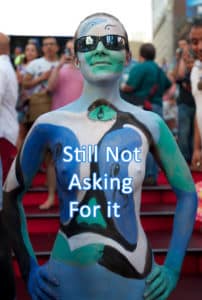
It all boils down to victim-blaming and rape culture. Rape culture refers to a culture where sexual harassment and violence is considered normal. Women are routinely blamed for being sexually harassed, assaulted and even raped.
When a woman is a victim of a sexual crime, the first question some ask is, “What was she wearing?” Women are taught that it’s their fault when men “can’t control” themselves, that “boys will be boys” and it’s their responsibility to keep themselves safe through modesty.
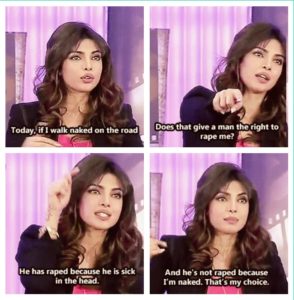
In reality, clothing is not some magical harassment-prevention tool. As I’ve already mentioned, harassment happens regardless of a woman’s state of dress or undress. Modesty rules and laws actually condone sexual harassment and violence by focusing on the victim’s behavior instead of the perpetrator. Rather than prevent or punish violent or criminal behavior, all they do is stifle women’s freedom and sexuality.
From a young age, girls’ sexuality is defined in terms of male heterosexuality. Girls are made to cover up their chests before their bodies have even developed because men look at that body part in a sexual way. As they grow up, girls often learn what’s sexually appealing to men before they even discover or figure out their own sexuality.
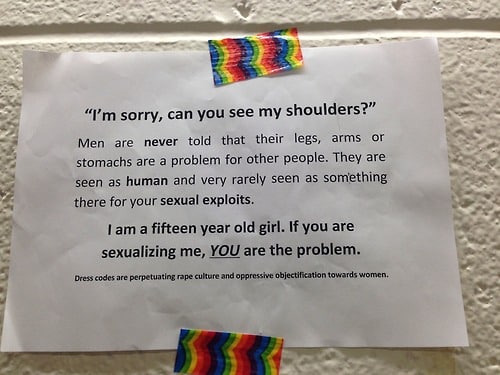
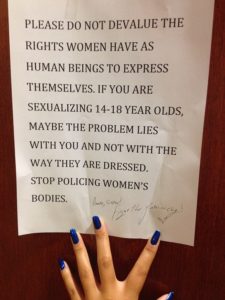
Case in point: school dress codes. There have been so many stories about school administrators banning certain clothing for girls, such as leggings or shorts or spaghetti straps, because it will “distract the boys.” Here instead of teaching boys and all students about consent and respect, they waste time policing girls’ bodies and attire. They blame the girls for having a body. Girls are taught that their own education, comfort and freedom are all secondary to boys’ needs, urges and desires.
So what’s the real solution to stopping creeps and perverts? To stopping sexual harassment, sexual violence and objectification?
Education and changing the culture. We need to build a new culture of consent, respect and equality. We need to stop victim-blaming and policing women’s bodies. Women’s bodies are NOT the problem, and modesty is NOT the solution. Limiting women’s freedom and self-expression is not and has never been the solution.
What I choose to wear or not wear should never be anyone else’s decision but my own. Even when I’ve chosen to be naked in a public way, I refuse to accept blame for any harassment I receive. I refuse to play into our prescriptive gender roles that say men are uncontrollable sex-driven beasts and that women are the sexually passive ones who must take responsibility for that. Anyone who blames women for getting sexually harassed, assaulted or raped, is perpetuating the rape culture in our society and refusing to acknowledge the real problems.

